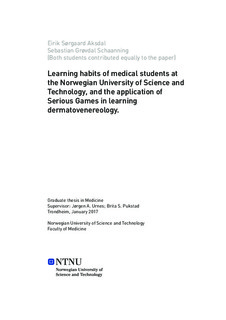| dc.description.abstract | Introduction
The interest in so called “Serious Games” (SGs) in education has increased, with several new RCTs in just the last few years, but there is not yet a clear consensus as to the potential benefit of using Serious Games in education. The objective of our study was to evaluate a Serious Game entitled “Save Your Skin” (SYS). We sought to contribute to the literature on SGs, and their application to higher education, more specifically the teaching of medicine. We also wanted to assess 4th year medical students’ opinions on the learning modalities available to them in terms of usage, degree of motivation, trustworthiness and relevance to exams.
Methods
Students were randomized to receive 100 multiple choice questions (MCQs) in dermatovenereology either as electronic flashcards or in the serious game SYS. Each student’s knowledge in the subject was assessed with 20 MCQs both before and after the intervention. Electronic questionnaires were used to assess students’ reading habits and subjective opinions on the intervention they received.
Results
There was no significant difference between the game group and the flashcard group regarding knowledge acquisition in dermatovenereology. The subjective post-intervention evaluation favored the flashcard setup over the gaming set up. Regardless of group, the students generally reported that they preferred the intervention they received over traditional teaching methods. Reviewing lectures scored consistently high regarding time usage, trustworthiness and relevance for exams on the pre-intervention questionnaire. There were only small differences in degree of motivation when comparing the different learning modalities.
Conclusion
4th year medical students at NTNU generally favor reviewing lectures for learning the curriculum, although it is not known whether this is related to the quality of lectures, or if it follows the focus on lectures in the course structure. Due to the vast heterogeneity of serious games, we cannot on the base of this study dismiss serious games to be used in a learning context. However, the development of serious games is of high economic and academic cost, and it is doubtful whether this is a cost effective way of spending faculty resources. In future research and development of SGs, we recommend identifying success factors of SGs whose efficacy have been proven in high quality studies. | nb_NO |
